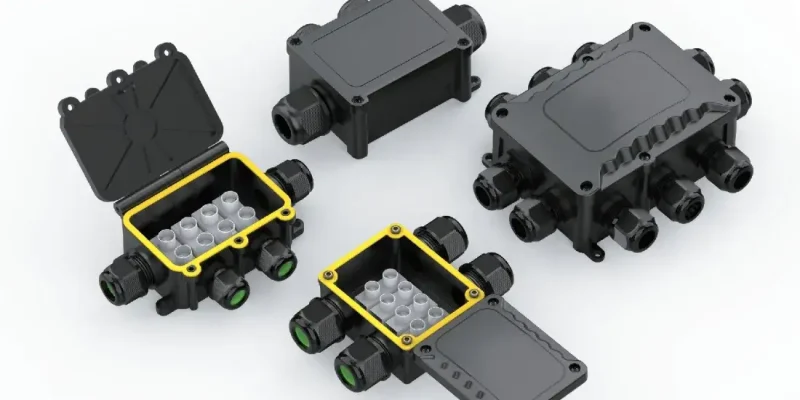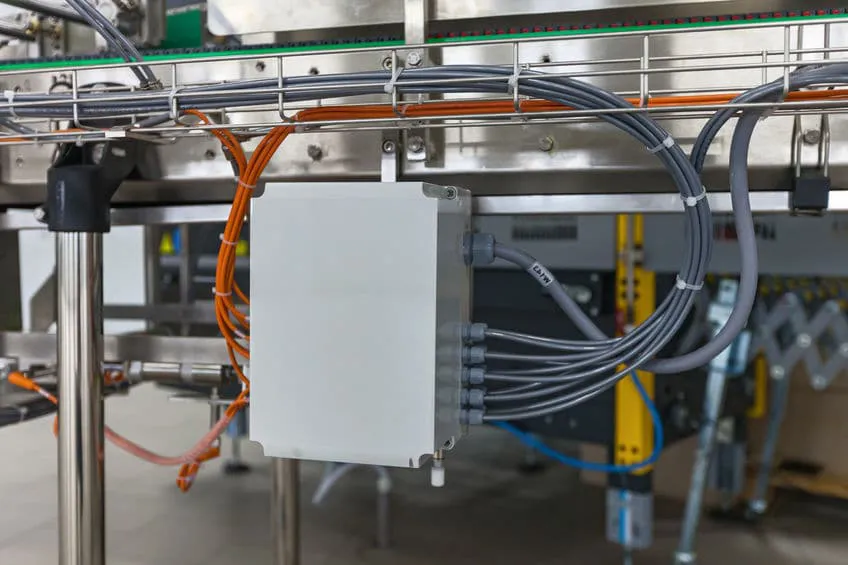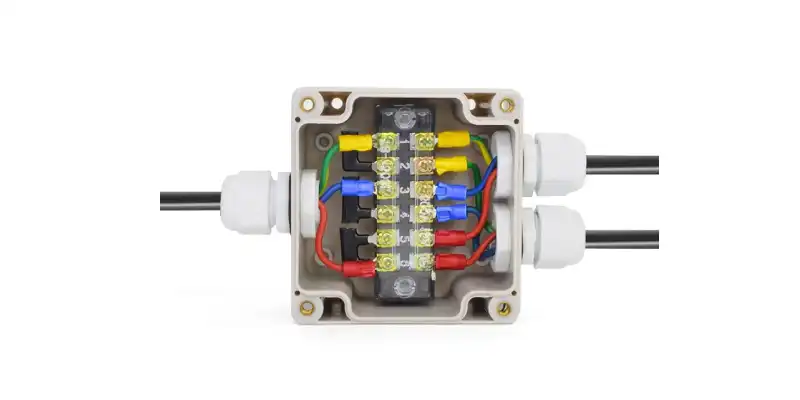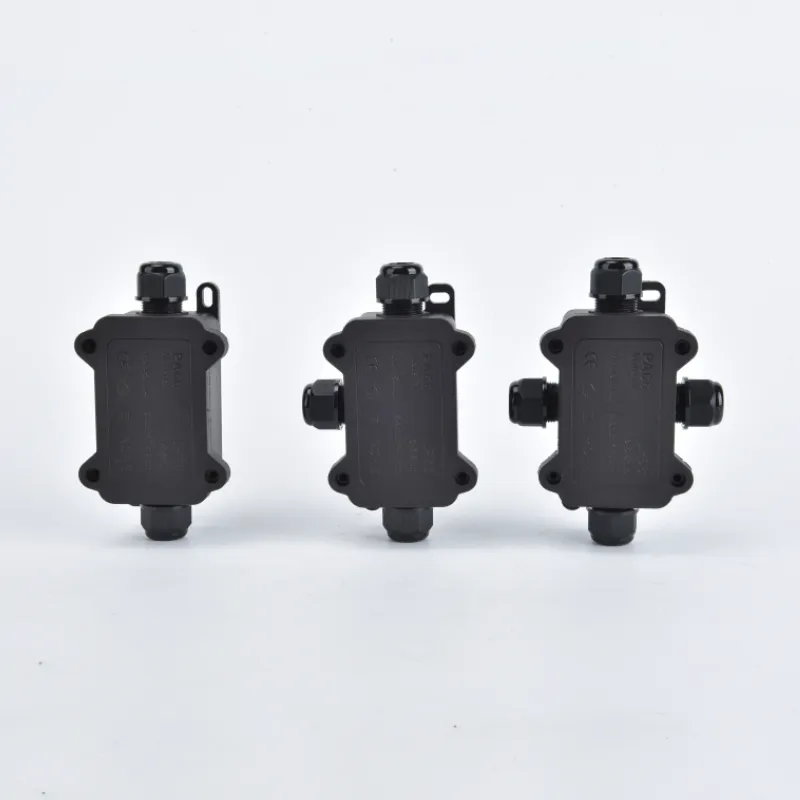Abzweigkästen spielen eine entscheidende Rolle in elektrischen Systemen, da sie als zentrale Knotenpunkte für die Stromverteilung und den Schutz dienen. Diese unverzichtbaren Komponenten erleichtern nicht nur die Verteilung des Stroms von einer einzigen Quelle auf mehrere Steckdosen, sondern haben auch einen erheblichen Einfluss auf die Sicherheit, Effizienz und Leistung von Stromversorgungssystemen.
Verteilerkästen und Stromverteilung
Abzweigkästen dienen als kritische Verteilungspunkte in elektrischen Systemen, die im Vergleich zu anderen Schaltkreiskomponenten höhere Stromlasten bewältigen. Sie ermöglichen die Aufteilung des Stroms von einer einzigen Quelle auf mehrere Steckdosen oder Geräte, wodurch der Stromfluss in einem Gebäude oder einer Struktur effektiv gesteuert wird. Diese zentralisierte Verteilungsfunktion ermöglicht ein organisierteres und effizienteres Strommanagement, reduziert die Komplexität von Verkabelungssystemen und erleichtert die Wartung und Fehlersuche in elektrischen Netzwerken.
Sicherheitsmerkmale für den Stromschutz
In Verteilerkästen integrierte Sicherheitsmerkmale spielen eine wichtige Rolle beim Stromschutz. Diese Komponenten schirmen elektrische Verbindungen vor Umwelteinflüssen wie Feuchtigkeit und Staub ab und verringern so das Risiko von Kurzschlüssen und Bränden. Darüber hinaus bieten Abzweigkästen eine Isolierung, um den versehentlichen Kontakt mit stromführenden Leitungen zu verhindern, was die Sicherheit der Benutzer erheblich erhöht. Indem sie die Kabelverbindungen ordnen und zusammenfassen, tragen sie auch dazu bei, Überlastungen zu vermeiden und eine ordnungsgemäße Lastverteilung zu gewährleisten, wodurch das elektrische System weiter geschützt wird.
Lastmanagement und Effizienz
Abzweigdosen gibt es in verschiedenen Stromstärken, um den spezifischen Stromanforderungen gerecht zu werden. Sie reichen von 20 Ampere für Beleuchtungsstromkreise bis zu 40 Ampere für Hochleistungsanwendungen wie Duschen und Herde. Bei ordnungsgemäßer Installation tragen diese Dosen zu effizienten Verdrahtungskonfigurationen bei und helfen, Energieverluste durch schlechte Verbindungen zu reduzieren. Sie unterstützen auch die Integration von Systemen für erneuerbare Energien und verbessern die Gesamtleistung des Stromnetzes. Abzweigdosen erleichtern die Verwaltung komplexer elektrischer Systeme, indem sie organisierte Verdrahtungspfade ermöglichen und so die Effizienz und Wartungsfreundlichkeit verbessern.
Technische Faktoren bei der Installation
Die ordnungsgemäße Installation von Anschlussdosen ist entscheidend für eine optimale Leistung der Stromversorgung. Zu den wichtigsten technischen Faktoren gehören:
- Wärmemanagement und Belüftung zur Vermeidung von Überhitzung und Erhaltung der Effizienz.
- Sicherstellung qualitativ hochwertiger, stabiler Verbindungen zur Minimierung von Leistungsverlusten.
- Richtige Erdung für Sicherheit und Leistungssteigerung.
- Geeignete Dimensionierung für die erforderliche Anzahl von Anschlüssen und die Stromlast.
- Einhaltung der elektrischen Vorschriften zur Vermeidung von Stromkreisausfällen und Sicherheitsrisiken.
Diese Überlegungen sind wichtig, um Probleme mit der Stromversorgung zu vermeiden und die Langlebigkeit und Zuverlässigkeit des elektrischen Systems zu gewährleisten. Elektriker müssen diese Faktoren bei der Unterbringung von Stromversorgungen aus Gründen der Sicherheit, der Einhaltung von Brandschutzvorschriften und des Wetterschutzes häufig sorgfältig berücksichtigen.
Einfluss des Materials der Anschlussdose auf die elektrische Leistung
Das für die Konstruktion von Anschlussdosen verwendete Material hat erheblichen Einfluss auf die elektrische Leistung und die Eignung für verschiedene Anwendungen. Anschlussdosen aus Metall, in der Regel aus Stahl oder Aluminium, bieten eine hervorragende Wärmeableitung und Abschirmung gegen elektromagnetische Störungen (EMI). Dadurch sind sie ideal für Anwendungen mit hoher Leistung und für Umgebungen mit elektromagnetischen Problemen. Insbesondere Aluminium-Abzweigkästen bieten eine hervorragende Korrosionsbeständigkeit und sind leicht, so dass sie sich für Außeninstallationen eignen.
Nichtmetallische Abzweigkästen, z. B. aus PVC oder Glasfaser, bieten in bestimmten Situationen deutliche Vorteile. Diese Materialien bieten eine hervorragende elektrische Isolierung und Beständigkeit gegen Feuchtigkeit und Chemikalien. Abzweigkästen aus Glasfasern kombinieren beispielsweise eine hohe Durchschlagsfestigkeit mit einer langen Lebensdauer und eignen sich daher für raue Industrieumgebungen. Die Wahl des Materials wirkt sich direkt auf die Fähigkeit des Anschlusskastens aus, die elektrischen Verbindungen zu schützen, die Hitze zu bewältigen und die Systemintegrität aufrechtzuerhalten, was sich letztendlich auf die Gesamtleistung und Sicherheit des Stromverteilungssystems auswirkt.
Wärmeleitfähigkeit und Leistung
Die Wärmeleitfähigkeit spielt eine entscheidende Rolle für die Leistung und Zuverlässigkeit von Anschlussdosen, insbesondere bei Anwendungen mit hohem Stromverbrauch oder im Freien. Materialien mit höherer Wärmeleitfähigkeit, wie Aluminium oder Nanosilberpaste, leiten die von den elektrischen Verbindungen erzeugte Wärme hervorragend ab und verringern so das Risiko einer Überhitzung und verlängern die Lebensdauer der internen Komponenten. Die außergewöhnliche Wärmeleitfähigkeit von Aluminium macht es zum Beispiel ideal für industrielle Umgebungen, in denen eine effiziente Wärmeableitung entscheidend ist.
Im Gegensatz dazu bieten nichtmetallische Werkstoffe wie PVC oder Glasfaser eine geringere Wärmeleitfähigkeit, kompensieren dies aber durch bessere Isoliereigenschaften. Die langfristige Einwirkung hoher Temperaturen kann jedoch die thermische Leistung von Verbindungsmaterialien wie SAC305-Lot beeinträchtigen, das im Laufe der Zeit einen erhöhten thermischen Widerstand und Alterungseffekte aufweist. Nanosilberpaste hingegen weist eine ausgezeichnete thermische Stabilität und minimale Widerstandsänderungen selbst unter anhaltenden Hochtemperaturbedingungen auf, was sie zu einer hervorragenden Wahl für die Aufrechterhaltung der Sperrschichttemperatur und der Gesamtsystemeffizienz macht.
Korrosionsbeständigkeit von Materialien
Die Werkstoffe für Abzweigkästen spielen eine entscheidende Rolle bei ihrer Korrosionsbeständigkeit, die sich direkt auf die Langlebigkeit und Zuverlässigkeit elektrischer Systeme auswirkt. Edelstahl Typ 316 zeichnet sich durch seine außergewöhnliche Korrosionsbeständigkeit aus, insbesondere gegen Lochfraß und Spaltkorrosion, und ist damit ideal für raue Umgebungen wie Salzwasser oder chemisch aggressive Umgebungen. Diese Beständigkeit führt im Laufe der Zeit zu geringeren Wartungs- und Austauschkosten.
Nichtmetallische Materialien bieten deutliche Vorteile bei der Korrosionsbeständigkeit. PVC- und Glasfaserabzweigkästen sind von Natur aus korrosionsbeständig und eignen sich für Nassbereiche und verschiedene nichtmetallische Verkabelungssysteme. Aluminium-Abzweigkästen bieten eine ausgezeichnete Korrosionsbeständigkeit und gleichzeitig die Vorteile einer leichten Konstruktion und einer effizienten Wärmeableitung. Für Umgebungen mit extremer Korrosionsbelastung bieten speziell entwickelte Gehäuse, die die ISO 12944-Normen erfüllen, wie z. B. C5- und CX-Bewertungen, einen hervorragenden Schutz in Offshore- und hochkorrosiven industriellen Umgebungen.
Zugehöriges Produkt
Ähnlicher Artikel
Verteilerkästen verstehen: Wichtige Komponenten für sichere und effiziente elektrische Systeme





